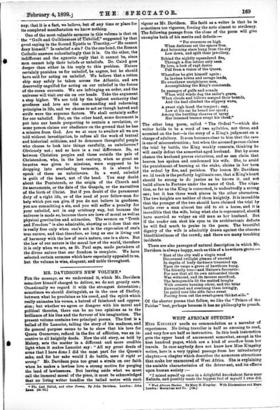MR. DAVIDSON'S NEW VOLUME.*
FOR the message, as we understand it, which Mr. Davidson ooneidere himself charged to deliver, we do not greatly care. Occasionally we regard it with the strongest detestation ; sometimes we should distinguish, as in the case of Shelley, between what he proclaims as his creed, and the spirit which really animates his verses, a hatred of falsehood and oppres- sion; but whether we agree or disagree with his moral and political theories, there can be no two opinions as to the brilliance of his line and the fervour of his imagination. The present volume contains two principal poems. The first is a ballad of Sir Lancelot, telling the story of his madness, and its general purpose seems to be to show that his love for Queen Guenevere, refined in the fire of affliction, was an in- centive to all knightly deeds. Now the old story, as told by Malory, sets the matter in a different and more credible light when it makes Lancelot say : " All my great deeds of arms that I have done I did the most part for the Queen's sake, and for her sake would I do battle, were it right or wrong." Mr. Davidson puts too great a strain on our faith when he makes a lawless love a strong motive for purging the land of lawlessness. But leaving aside what we must call the immoral moral of the piece, it must be acknowledged that no living writer handles the ballad metre with such • The Last Bal,ad, and other Poems. By John Davidson. London John Lane. pe. 6d.)
vigour as Mr. Davidson. His fault as a writer is that he is sometimes too vigorous, forcing the note almost to stridency. The following passage from the close of the poem will give examples both of his merits and defects :—
" For evermore on high When darkness set the spaces free, And brimming stars hung from the sky Low down, and spilt their jewellery,
Behind the nightly squandered fire, Through a dim lattice only seen By love, a look of rapt desire
Fell from a vision of the Queen.
Wherefore be girt himself again :
In lawless towns and savage lands, He overthrew unrighteous men,
Accomplishing the King's commands.
In passages of gulfs and sounds
When wild winds dug the sailor's grave, When clouds and billows merged their bounds, And the keel climbed the slippery wave, A sweet sigh laced the tempest ; nay, Low at his ear he heard her speak ; Among the hurtling sheaves of spray Her loosened tresses swept his cheek."
The other long poem, called " The Ordeal "—which the writer holds to be a word of two syllables, not three, and accented on the last—is the story of a King's judgment on a charge of adultery. It soon becomes clear to him that the case is one of misconstruction ; but when the accused person claims the trial by battle, the King weakly consents, thinking he will easily defeat the somewhat aged husband. But by some chance the husband proves victorious, and so can claim that heaven has spoken and condemned his wife. She, to avoid the punishment of burning at the stake, claims in her turn the ordeal by fire, and perishes. The lesson Mr. Davidson wo Id teach is the perfectly legitimate one, that a'King's heart should he strong to do justice as he knows it, and not build altars to Fortune under the name of God. The situa- tion, so far as the King is concerned, is nndonbtedly a strong one; but it has three weak places in the other characters.
The two knights are neither of them knightly. It is incredible that the younger of the two should have claimed the trial by battle over a man almost too old to sit a horse, and it is incredible that the wife, being what she is represented, should have married so vulgar an old man as her husband. But if the reader can shut his eyes to its architectonic defects he will find much to praise in the poem. The beautiful dignity of the wife is admirably drawn against the obscene bloodthirstiness of the crowd; and there are many touching incidents.
There are also passages of natural description in which Mr. Davidson is always happy, such as this of a hawthorn grove :-
" East of the city wall a virgin wood
Discovered twilight gleams of emerald
In depths of leafy darkness treasured up. Upon its verge a grove of hawthorn hung,
The friendly tree—and Nature's favourite: For now that all its own unhoarded bloom Was withered, and its incense sacrificed, The honeysuckle lit the matted boughs With cressets burning odour, and the briar Enwreathed and overhung them lovingly,
Its pallid rose like elfin faces sweet
Peering from out the swart-green thicket.eide."
Of the shorter poems that follow, we like the "Prince of the Fairies" best, perhaps because it has no philosophy to preach.


































 Previous page
Previous page